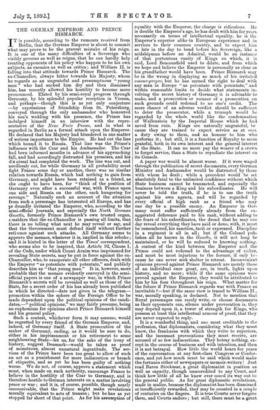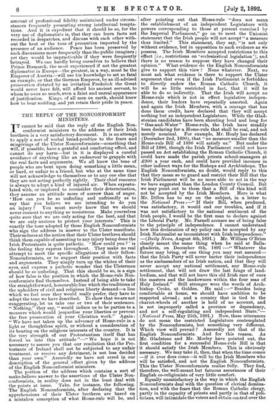THE GERMAN EMPEROR AND PRINCE BISMARCK.
IT is possible, according to the rumours received from Berlin, that the German Emperor is about to commit what may prove to be the gravest mistake of his reign. It is one of the many difficulties of a Sovereign who visibly governs as well as reigns, that he can hardly help treating opponents of his policy who happen to be his own subjects, as enemies as well as critics ; and William II. is falling into that attitude towards Prince Bismarck. The ex-Chancellor, always bitter towards his Majesty, whom he regards as an ungrateful and presumptuous "young man" who had sucked him dry and then dismissed him, has recently allowed his hostility to become more pronounced. Elated by his semi-royal progress through Germany, by his splendid popular reception in Vienna, and perhaps—though this is as yet only conjecture —by expressions of friendship from St. Petersburg, conveyed through the only ambassador who honoured his son's wedding with his presence, the Prince has indulged himself in an interview with the repre- sentative of the Neue Freie Presse, and in what is regarded in Berlin as a formal attack upon the Emperor. He declared that his Majesty had blundered in one matter • of serious importance to the Empire. He had cut the line which bound it to Russia. That line was the Prince's influence with the Czar and his Ambassador. The Czar had been informed months in advance of his approaching fall, and had accordingly distrusted his promises, and his dismissal had completed the work. The line was cut, and needlessly cut, for while Germany in all probability must fight France some day or another, there was no similar relation towards Russia, which had nothing to gain from Germany, and might have been retained as a friend, as she ought to have been, for "think of the position of Germany even after a successful war, with France upon one side and Russia on the other, each hungering for revenge." Naturally such an account of the situation from such a personage has interested all Europe, and has pr ,foundly irritated the Emperor, who, according to the semi-official journals, and especially the North German Gazette, formerly Prince Bismarck's own trusted organ, cmsiders that the ex-Chancellor is passing all limits, that there is no telling -what next he may reveal or say, and that the Government must defend itself without further reticence against such attacks. All Germany seems to approve the menace, whatever it is, implied in this rebuke ; and it is hinted in the letter of the Times' correspondent, who seems also to be inspired, that Article 92, Clause 1, of the Code, under which Count Arnim was imprisoned for revealing State secrets, may be put in force against the ex- Chancellor, who, to exasperate all other offences, deals with the Emperor "as potentate with potentate," and publicly describes him as "that young man." It is, however, more probable that the menace evidently conveyed in the semi- official papers is one of a newspaper war, in which Prince Bismarck's secrets will be revealed as well as those of the State, for a secret order of his has already been published in which he directed—date not given in the telegram— promotion within the sphere of the Foreign Office to be made dependent upon the political opinions of the candi- dates,—" political opinions," we may fairly presume, being an euphemism for opinions about Prince Bismarck himself and his general policy.
Such a contest, whichever form it may assume, would be regretted by every friend of the German Emperor, and, indeed, of Germany itself. A State prosecution of the maker of Germany, ending, as it would be sure to do, either in his imprisonment or his retirement to some neighbouring State—let us, for the sake of the irony of history, suggest Denmark—would be taken as proof of monstrous, almost unnatural ingratitude. The ser- vices of the Prince have been too great to allow of such an act as a punishment for mere indiscretion or breach of etiquette, and as yet he has been guilty of nothing worse. We do not, of course, approve a statement which must, when made on such authority, encourage France to believe in the hostility of the Czar to Germany, and is therefore hostile to German interests on a matter involving peace or war ; and it is, of course, possible, though nearly inconceivable, that the Prince might make revelations morally equivalent to acts of treason ; but he has as yet stopped far short of that point. As for his assumption of equality with the Emperor, the charge is ridiculous. He is double the Emperor's age, he has dealt with him for years necessarily on terms of intellectual equality, he is the Emperor's superior alike in European experience and in services to their common country, and to expect him so late in the day to bend before his Sovereign, like a midshipman before an Admiral, would be an instance of that portentous vanity of Kings on which, it is said, Lord- Beaconsfield used to dilate, and from which we hope and believe the Emperor is personally as clear as his grandfather would have been. Prince Bismarck may be in the wrong in displaying so much of his irritated amour-propre, but he has earned the right to deal with any man in Europe "as potentate with potentate," and. within reasonable limits to decide what statements in- volving the secret history of Germany it is advisable to make, and a prosecution or menace of a prosecution on such grounds could redound to no one's credit. The mere chance of an adverse verdict should be sufficient to deter the prosecutor, while a. triumph would be regarded by the whole world like the condemnation of Wallenstein by the Imperial House which he had saved from ruin. Kings are naturally ungrateful, be cause they are trained to expect service as at once. a duty owing to them, and an honour to him who performs it ; but still, it is a function of Royalty to seem grateful, both in its own interest and the general interest of the State. It can no more pay the wearer of a crown to forget service, than a State to repudiate the interest on its Consols.
A paper war would be almost worse. If it were waged through the publication of secret documents, every German Minister and Ambassador would be distrusted by those with whom he dealt ; while a precedent would be set absolutely fatal to the unlimited confidence without which State business cannot be transacted, and. especially the business between a King and his subordinates. He will never be told the truth, if he is to use the truth against his own agents, and will be regarded by every official of high rank as a friend who may one day be a possible enemy. An Emperor in Ger- many must suffer sufficiently already from the ex- aggerated deference paid to his rank, without adding to the fears of his subordinates, the dread that he may one day reveal everything they have said or done, with, it must be remembered, his sanction, tacit or expressed. Discipline in a regiment is all in all ; but if the Colonel pub- lishes all he knows in the Gazelle, it will not long be maintained, or he will be reduced to knowing nothing. A contest of the kind between the Emperor and the Prince could not redound to the advantage of either, and must be most injurious to the former, if only be- cause he can never seek shelter in retreat. Inconvenient opinions proved against Prince Bismarck are merely those of. an individual once great, are, in truth, lights upon history, and no more ; while if the same opinions were proved against the Emperor, they would be attributed to him by his foes throughout his reign. What matter for the future if Prince Bismarck regards war with France as inevitable ?—but if the same view is traced to William II., war, morally speaking, is declared. Not to mention that Royal personages can rarely write, or choose documents as their opponents can, silence under provocation is, they may depend upon it, a tower of strength for Kings, who possess at least this intellectual armour of proof, that they are never expected to reply.
It is a wonderful thing, and one most creditable to the profession, that diplomatists, considering what they must know, the frankness with which they write to superiors, and the incessant provocations they must receive, are accused of so few indiscretions. They betray nothing, ex- cept in the course of business and with intention, and then it is not betrayal. How little the world hears for years of the conversation at any first-class Congress or Confer- ence, and yet how much must be said which would make the fortunes either of newspapers or memoir-writers ! Just read Baron Stockmar, a great diplomatist in position as well as capacity, though unaccredited to any Court, and think how little of all he knew ever oozed its way out to the general public. As for' great diplomatic revelations, made in malice, because the diplomatist has been dismissed or insufficiently rewarded, they may be counted in a couple of centuries on the fingers. It is true Courts never forgive them, and Courts endure ; but still, there must be a great stances frequently presenting strong intellectual tempta- tions. And it is expedient that it should be so, for the very use of diplomatist s is, that they can learn facts not recorded in despatches, and discuss with each other with- out the heat or the tone of precaution imported by the presence of an audience. Peace has been preserved by such discussions more frequently than the public imagines ; yet they would be impracticable if they were frequently betrayed. We can hardly bring ourselves to believe that Prince Bismarck, the most experienced if not the greatest diplomatist in Europe—the greatest, in a way, must be the Emperor of Austria—will use his knowledge to set so fatal an example, or that the German Emperor, by an ill-advised prosecution dictated by an irritation Frederick the Great would never have felt, will afford his ancient servant, to whom he owes so much, even a faint and unreal appearance of justification. Kings. of all men on earth, should know how to bear scolding, and yet retain their pride in peace.











































 Previous page
Previous page